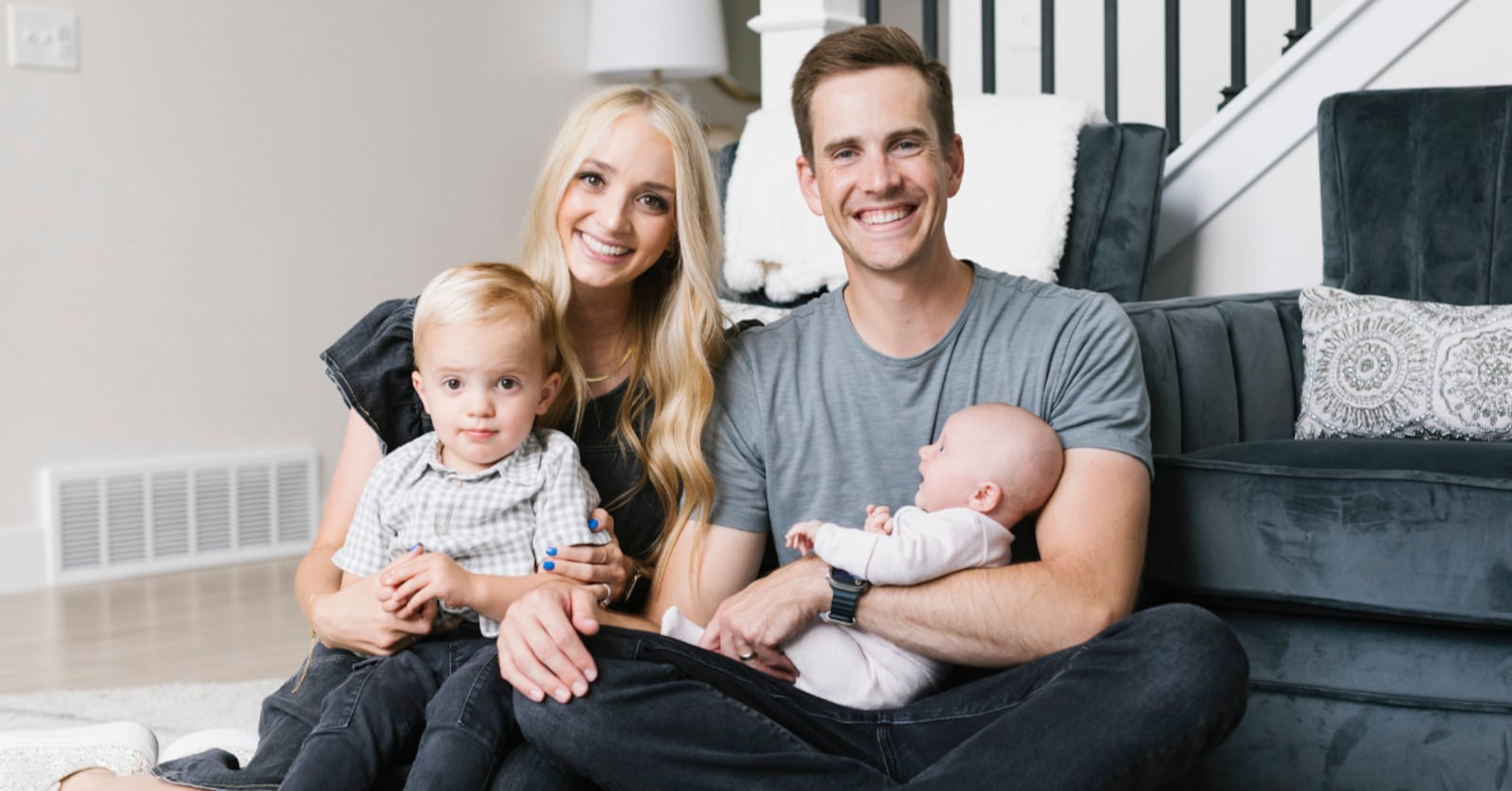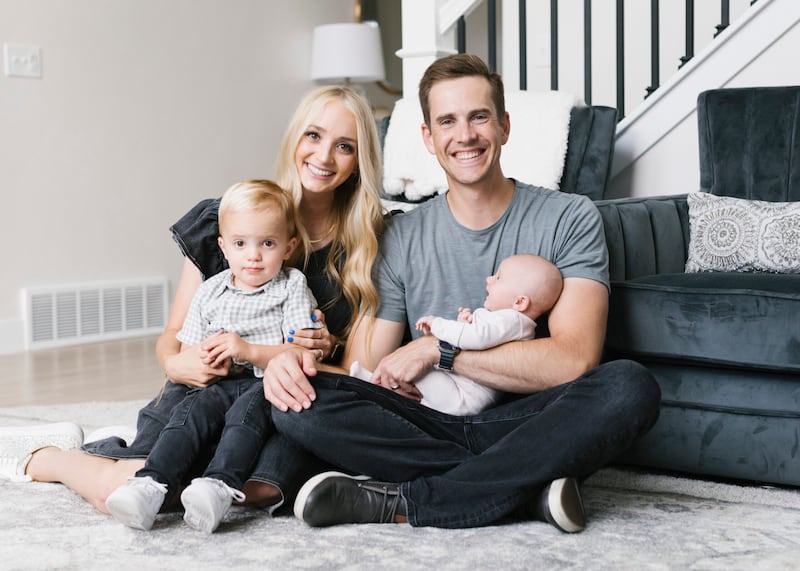
Photo courtesy of Marinne Pearson
The Founder Series is a column by and about Utah founders and how they got to where they are today. Click here to read past articles in the series.
As I sit down to write this story, I’m two weeks from having my second child. When we started Campfire, I never could have predicted the journey I would embark on. My founding story includes a pandemic, a miscarriage, an MBA, three co-founders, two baby boys and countless lessons learned.
When I was little, I danced competitively, did my best in school, loved to be creative and had an intense desire to achieve. I was close to my parents and wanted to make them proud. They both went to Brigham Young University—I knew I could get a good education there, so I followed in their footsteps.
When I was trying to choose a major, I had a lot of conversations with my dad. He is a doctor and has had a great career. I thought I wanted to be a physical therapist, but he told me, “Marinne, in physical therapy, you’re always going to be working for someone else. I don’t think you’re going to love that.”
I trusted my dad a lot, and he reminded me of my unique strengths and my passion for creativity and numbers. I vividly remember when he encouraged me to consider business school. He gave me the push I needed to pursue an education in business—a decision that would prove pivotal for me and would become the starting point for this unexplainable adventure.
When a former coworker asked if I would be interested in a role at Lucid, I jumped at the chance. Until this point, I was working in scrappy roles, figuring things out as I went. Now, I would have the opportunity to work in a company that felt like a startup but had the maturity of a more established company. The marketing team was still small, so I was able to wear a lot of different hats. It didn’t hurt that I also got to travel the world.
As Lucid grew, my role became much more specific to events. The things I loved most about marketing—creativity, brand, positioning and writing—were no longer as much a part of my job. I felt stuck. I talked a lot about these feelings with my husband, and it turned out he was feeling stuck, too.
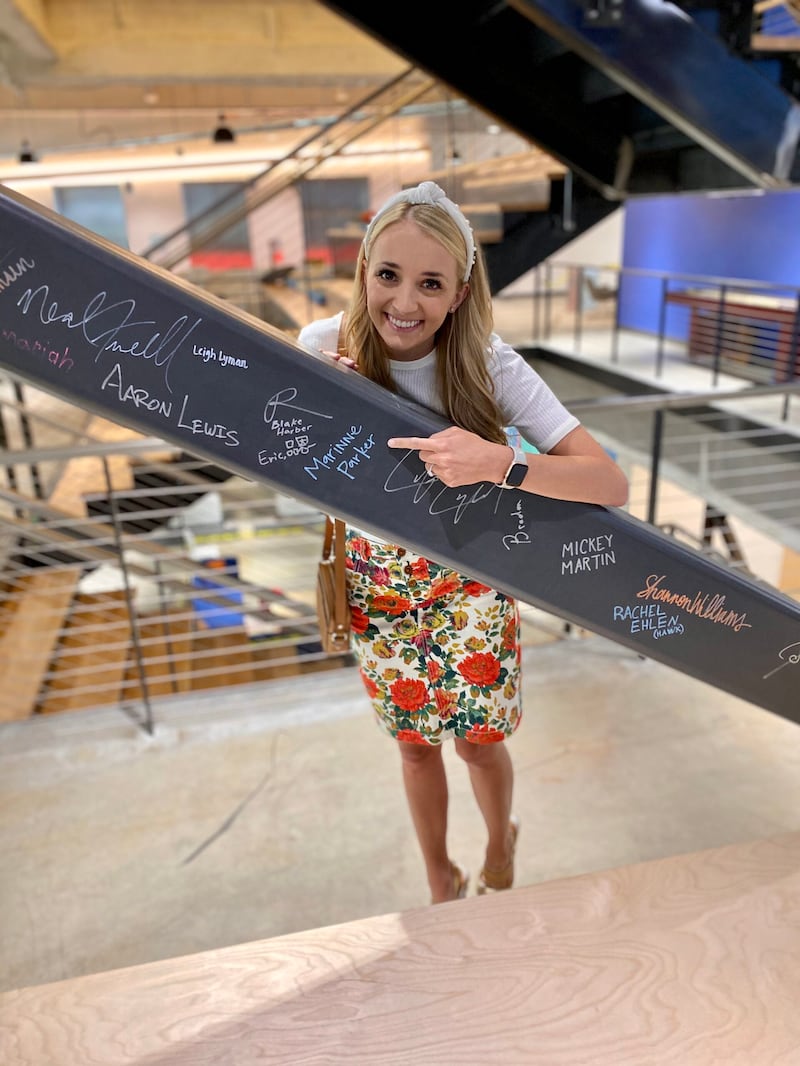
Photo courtesy of Marinne Pearson
Business degrees and chance encounters
My husband and I decided to pursue our professional MBA degrees at the University of Utah together. The program was part-time and felt like a good way for us to figure things out before having kids and advancing further in our careers. I knew the experience would help us build new skills and new connections, but I had no idea just how impactful it would be. The people I met in that program opened doors I could only dream of.
On January 30, 2020, I received this text message:
“Hi Marinne, you come with a very high recommendation by one of your peers. He said you’re absolutely the best. I would love it if we could connect at Silicon Slopes because I’m starting a new venture and would love your perspective. Would you be up for a quick chat there? – Steve”
At the time, Steve Arntz was the CEO of a company called BookClub that was only two days old. I scheduled some time to meet with him and his co-founder, Todd Ericksen, while we were all together at Silicon Slopes. Steve and Todd shared a ridiculously unformed vision about how we were going to change the world by getting more people to read books together. They said they might want me to lead marketing for them, and I had no idea what to make of the conversation.
We didn’t talk again until March. Steve reached out several times, but I was very busy. I also assumed that because they waited so long to reach out to me, I must not have been very important to them and their strategy.
The timing of events couldn’t have been better. When Steve sent a last-ditch text message, we were in the middle of a pandemic. I no longer had a long commute to work, and my MBA became fully remote. I had the flexibility for new projects and creative pursuits. When I met with Steve, I decided to give this new company a try. We decided to work together for one month on a trial basis.
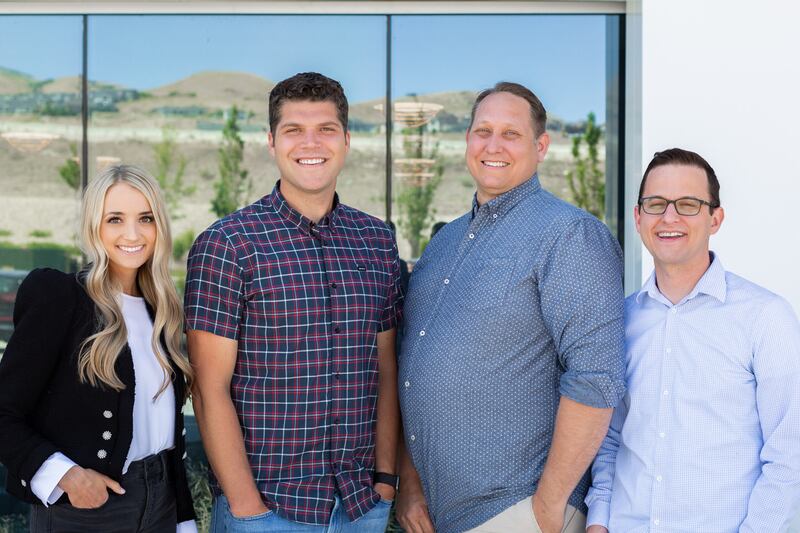
Photo courtesy of Marinne Pearson
A brand is born
Within weeks of starting, we realized we needed to change our name and brand. Because I was leading marketing, Steve asked if I could lead the project. I only had a day to prepare, so I did what any respectable marketer would do in my shoes: I Googled it. I researched different frameworks and learned everything I could about the importance and impact of a brand. What stood out to me was the importance of creating a feeling for your customers.
Steve asked me if I needed his help with the process. Because I’m deeply introverted and it was important to me to lead the experience, I told Steve that I could take it on my own. I designed a deeply inclusive process that had us writing and reflecting on key questions. We spent a full day thinking through the problems we were solving, the jobs to be done, and the emotions we wanted to create for the people who would experience our brand.
We talked about how our brand needed to stand for connection and growth. I suggested names like Park Bench, Front Porch, Picnic Table, and Campfire. In the end, Campfire symbolized that place for connection that was a universal experience nearly everyone could relate to. We could provide our customers, users and employees with a place that was warm and welcoming—a place of gathering. I felt a sense of pride and ownership in a company that I still wasn’t fully a part of.
Taking the leap
I wasn’t the only one on a 30-day trial period with Campfire. Taylor Murphy had also been considering a position. We both wanted to find a way to work with Todd and Steve, who each brought so much experience and passion to the business, and we felt like it would be a unique opportunity to be part of something from the very beginning. We still had no idea what we were signing up for.
In my early conversations with Steve, I told him I needed to be earning a salary to leave my full-time job at Lucid. Taylor had been a bit more assertive in his willingness to jump right in, so they started to meet as a founding team without me.
In one of those meetings, Taylor asked Steve and Todd, “Hey, why isn’t Marinne here?” They had a long conversation about the types of skills we needed to get the business moving and decided it would be best to at least give me the opportunity to decide if I could jump in.
Steve invited me to lunch, and when we sat down, he said, “Marinne, I’m done being your mentor and your friend. I need to be the CEO of Campfire. I know this might not be what is best for you, but what is best for Campfire is that you leave your job at Lucid and come join us.”
Up to that point, I hadn’t really considered it. I talked to him about the home that my husband and I had just purchased and how challenging that would be financially. He asked me to consider it. I talked to my husband, and we decided we could go a bit without earning a paycheck. We talked to our parents, and they surprised us by saying, “Now is the time to take risks because you’re young and you don’t have kids. You might as well give it a shot.”
When Steve presented me with an offer, he also arranged for me to talk to other founders and investors in the area. I was told that these women would give me unbiased feedback on the offer and help me make a good decision. I didn’t know what to expect, but I was delighted to find that they were indeed looking out for me and my best interest.
They both told me I should get more than what was offered and that I should be an equal member of the founding team. This was even more important to me because I would be the only woman on a team with three men. I needed to know that I would have a seat at the table and a voice in the room.
I had conversations with the team about what I wanted and what I felt I deserved being a co-founder, and they were willing to accommodate me. It was a challenging time, but they were very open to making me feel like an equal partner, which was huge for me. After beginning collaborations in March 2020, I came on full-time that July.
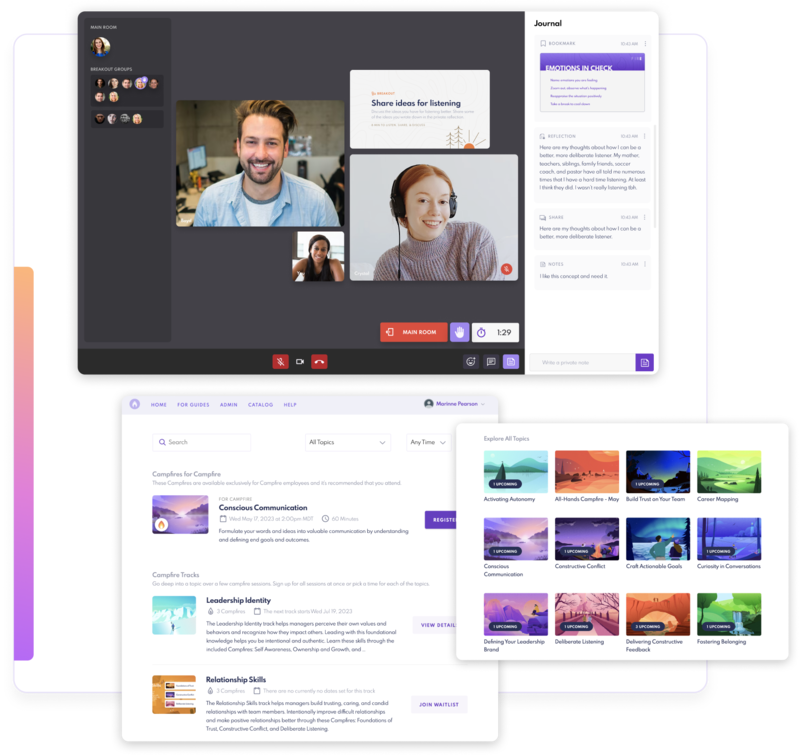
Image courtesy of Campfire
Challenges, challenges, challenges
When the business started, the plan was to bring the world together through reading. The first customers were all companies paying us to deliver book clubs to their employees. We built content and technology to support these experiences. The business acquired almost 20 customers and started to build revenue, but it just wasn’t growing fast enough.
I thought it would only be possible to go without a paycheck until December. In November, we realized the business wasn’t going to work in its current form. We all met at my house to do some market research and validation work. After that meeting, we decided to pivot the business.
Many of our customers were using our products and services to train their leaders and managers. We decided to lean into that opportunity, and within weeks, we had two new customers and triple the revenue. We had a pitch deck and were starting to gain interest from investors. We thought the business might just have a chance.
This was also when things started to become very difficult for me. After I started in July, I had a miscarriage. In October, I was pregnant again and constantly felt sick. The pandemic continued, and over the holidays, I caught COVID.
For several months, it was difficult to show up the way I wanted to. I faded into the background a bit while trying to do as much as I could to keep up, and the team started to wonder what was going on. I have never been one to share details about my personal life with my coworkers, and with this being my first pregnancy, I waited to tell the team about my situation.
When I came home from the holiday break, Steve scheduled lunch for us to talk. We spent three hours together. In that conversation, I realized just how different it is to work with a founding team. You are taking a big risk together and people depend on you. Steve made it clear that I wasn’t meeting expectations, and that’s when I told him what had been going on.
I met with the rest of the team the next day, and it was like a switch flipped. I felt relief knowing the team was willing to find a path forward and that everyone knew my situation. I was still uncertain how being a mom and starting a company would be compatible, but I was sure that we could find a way to make it work. That experience gave me new perspectives and a resolve to give everything I could to help my team be successful.
Assembling the puzzle pieces
As maternity leave approached, some interesting things started to happen. I began to realize that my desires to be successful as a mom and a founder were both very strong and very compatible. As I prepared for my first child to be born, I had a new energy and motivation. I was able to work through challenging things quickly, and I went into a mode of preparation in both my life and my work that was very new to me. In the last week before my son was born, I was starting to see the ways in which the pieces of the business could fit together to support longer-term growth.
Since having my first child, the business has not gotten easier. In fact, things have continued to become more and more challenging. I’m faced with new things to learn and do every single day. I’ve been fortunate to build a team, sit at the boardroom table, build my own vision and help drive the strategy of our business while my son has been right there with me. We’ve built a beautiful brand, worked with amazing customers all over the world and developed products and services that are changing lives.
Campfire is on a mission to close the connection gap by connecting companies through coaching and conversations. The work we are doing has become meaningful to me in my family and as a mother. It has helped me to enrich and repair relationships in my personal life. I have been able to set a foundation for success in my home. I’ve started to focus on the ways in which my work improves when things are going well at home. When I feel connected to the people I care about the most, I am able to show up more effectively in all of my spaces and roles.
I want everyone to realize how important it is to take care of yourself and your most important connections and how impactful it will be to companies, communities and the world as we put those things first. I look forward to helping more people feel connected to themselves, their families and their teams so they can show up in the spaces that are most important to them.
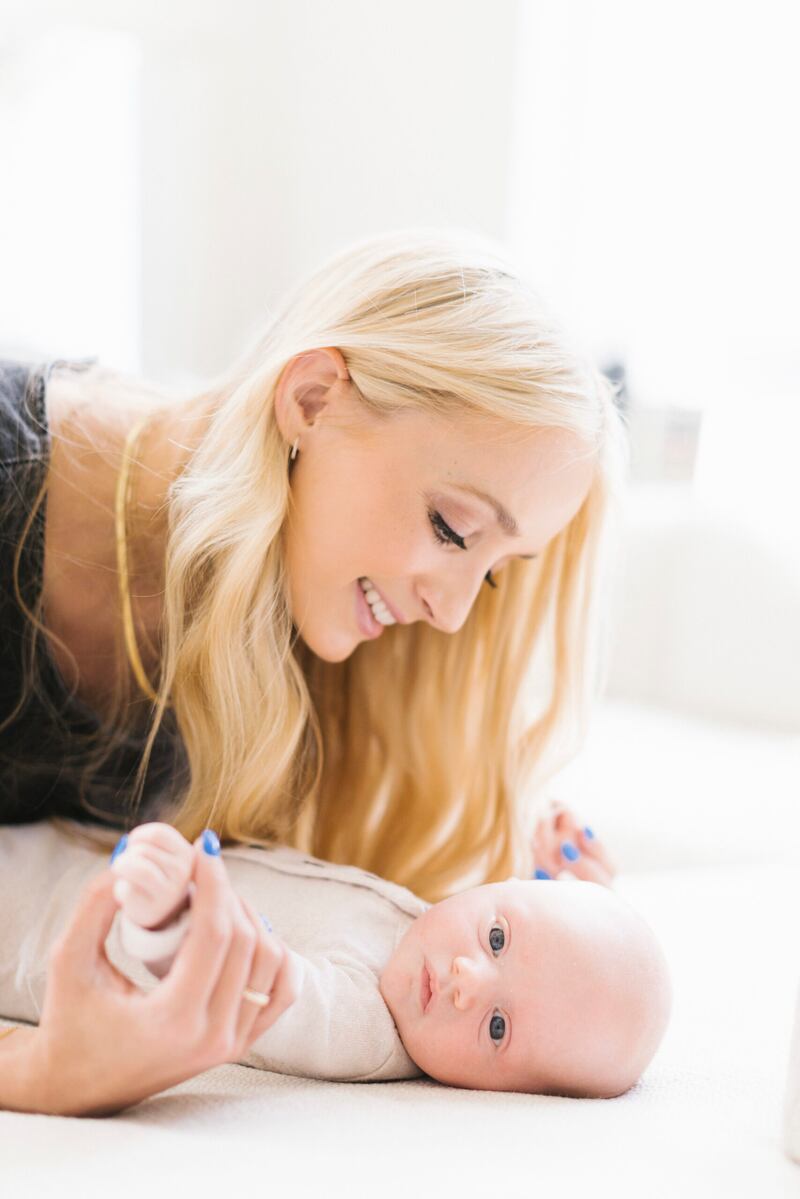
Photo courtesy of Marinne Pearson

